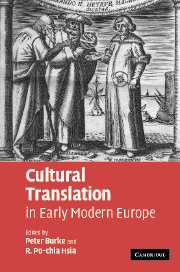Book contents
- Frontmatter
- Contents
- Notes on contributors
- Introduction
- PART I TRANSLATION AND LANGUAGE
- PART II TRANSLATION AND CULTURE
- 5 Early modern Catholic piety in translation
- 6 The translation of political theory in early modern Europe
- 7 Translating histories
- 8 The Spectator, or the metamorphoses of the periodical: a study in cultural translation
- PART III TRANSLATION AND SCIENCE
- Bibliography
- Index
5 - Early modern Catholic piety in translation
Published online by Cambridge University Press: 27 July 2009
- Frontmatter
- Contents
- Notes on contributors
- Introduction
- PART I TRANSLATION AND LANGUAGE
- PART II TRANSLATION AND CULTURE
- 5 Early modern Catholic piety in translation
- 6 The translation of political theory in early modern Europe
- 7 Translating histories
- 8 The Spectator, or the metamorphoses of the periodical: a study in cultural translation
- PART III TRANSLATION AND SCIENCE
- Bibliography
- Index
Summary
Translations matter so much in the history of early modern Catholicism that one might easily argue ‘no translations, no spiritual renewal, no Catholic Reformation’ – at least not the kind of Reformation that historians now seem to take for granted. One counterfactual exercise alone should suffice to prove this point. Imagine a different St Ignatius Loyola: a wounded Basque nobleman named Iñigo who remained untouched by religious fervour after his encounter with a cannonball at the Battle of Pamplona in 1521. What if this crippled Iñigo had dedicated his life to co-ordinating the local fiesta of San Fermín every July? What if he had looked forward more to the running of the bulls than to prayer and the service of God and the Catholic Church? How would Catholicism have evolved in the sixteenth and seventeenth centuries without St Ignatius and the Society of Jesus?
Everyone knows that history would have taken a very different turn if the convalescing Iñigo had not been confined to a room with nothing else to read but two devotional texts in translation: the Legenda aurea of Jacob Voragine and the Life of Christ of Ludolph of Saxony. Later in life, as Ignatius and others around him reconstructed the sequence of events that led to his religious conversion, these two translations would be given the credit – along with God Himself – for having changed the wounded soldier into a saint.
- Type
- Chapter
- Information
- Cultural Translation in Early Modern Europe , pp. 83 - 100Publisher: Cambridge University PressPrint publication year: 2007
- 9
- Cited by



